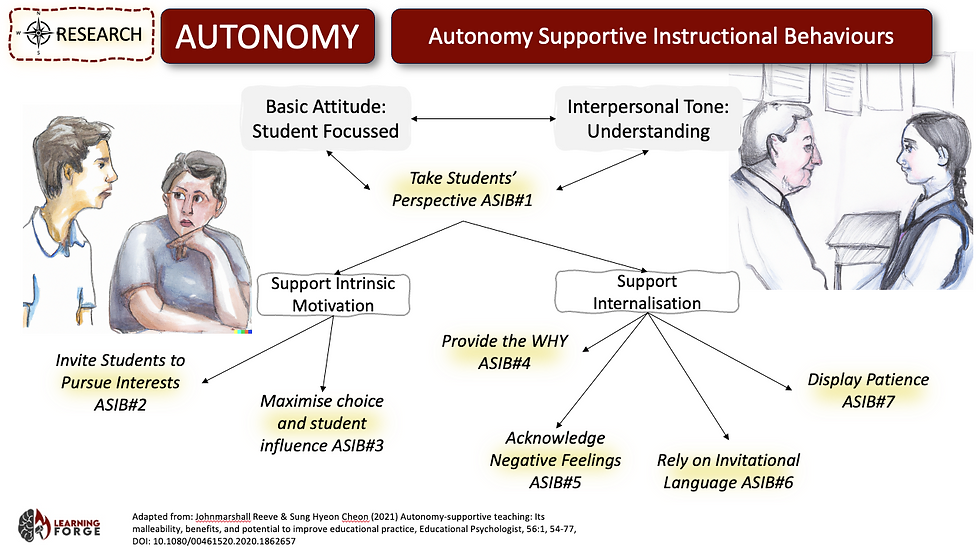Let them Steer
- Roger Kennett
- Feb 24, 2024
- 3 min read
Updated: Mar 4, 2024

Two recent gems of educational research are of immediate relevance to all teachers and especially those in remote and regional settings.
The foundation of developing self-determined young people is to nurture their needs for autonomy, competence and connectedness (belonging). These three become intensified in the adolescent years, so understanding and supporting them are critical for all teachers (educators of students pre, during and post adolescence).
The first research by Andrew Kingsford-smith et al (over 970 students in 16 regional and remote Australian government schools) investigates a vital aspect for academic success: academic self-efficacy. This is a student's belief that they have the resources to master the academic task they are facing. It is similar to the idea of a growth mindset - the belief that, "I can't do this -yet ". Students who have an, "I will be able to do this", approach to academic tasks enjoy greater success in the tasks.
It is important for all students, but academic self-efficacy is especially low for regional and remote students.
So, how can we improve students' self-efficacy? (and academic outcomes)
Answer: Support their need for a sense of autonomy.
Students need clear boundaries and need to know that these boundaries will be maintained by their teachers. In my experience, this is especially true for adolescent boys. Supporting autonomy is NOT about removing rules or lowering standards of behaviour. Think of it like teaching a learner driver. They will be able to drive autonomously (even AI is not quite that good -yet). That wonderful and scary feeling we had when we go our P's was partly the exhilaration of knowing that we could set off on an adventure of our own choosing. As Missy Higgins puts in, "you finally know, that you control were you go, you can steer". But that autonomy lies within the rules of the road. Your autonomy is not driving through the suburban backyards, knocking over clothes lines and people, it is autonomy within the boundaries. Indeed, our shared autonomy is greater because we have (and follow) rules of engagement, not less. This is an important lesson for our students (on the road or in our classroom).
Supporting student autonomy is the craft of giving students a say in what happens, a sense that they are listened to. Indeed, it forms one of the ten child safe standards - so it is not optional! Supporting student autonomy can be as simple as an assignment where students have to accrue 100 points, but get to choose from a list of sub-tasks with allocated point values. A great practical guide for teachers on supporting students' autonomy can be found here. (see lower for a summary graphic).
Our support of student's autonomy should be graduated, affording them greater choice and agency as they mature. Sadly, Andrew et al's research found the opposite to be true; students in secondary schools feel less autonomy supported than students in primary schools. This should ring alarm bells!
An important finding is that academic buoyancy, students' belief that they can cope with setbacks, mediates how well self-efficacy results in positive academic outcomes. Seems that supporting students autonomy growth AND teaching them that setbacks are part of life and represent effort not failure, go hand in hand.
However, if improving students' subjective experience of their schooling life AND their academic outcomes is not enough to persuade you, the second research project by Rebecca Collie et al, evidences how supporting student autonomy improves social-emotional competence and pro-social behaviours and well-being. Based on over 500 secondary students across Australia, students' perception of the level of autonomy support was probed with questions such as; “I feel that my teachers provide me with choices and options,” “My teachers encourage me to ask questions,” “My teachers listen to how I would like to do things,” and “My teachers try to understand how I see things before suggesting a new way to do things.” (I love that last question, it is so easy to jump into 'do it this way' before we have really listened to their perspective - note to self :) ).
Maybe a little action-research project is to run this survey with your class/year/school and see if you can improve the scores by the end of the year.
In essence, supporting students' autonomy needs, boosts their own social-emotional competence and this wonderful perception flows onto a bundle of educational goodies like pro-social behaviour (such as less likely to bully or allow bullying, more empathy for others, etc), self reflection (essential for fostering independent learners), and boosts positive feelings about schooling. (...and the academic outcomes as Andrew's research found).
In my experience, teachers's perceptions of their autonomy support by school leaders are happier and more likely to support student autonomy. Seems like no one enjoys being controlled and micromanaged - who'd have thought :)
How can I better support students' autonomy in my teaching? The adapted graphic below might whet your appetite for more.




Comments